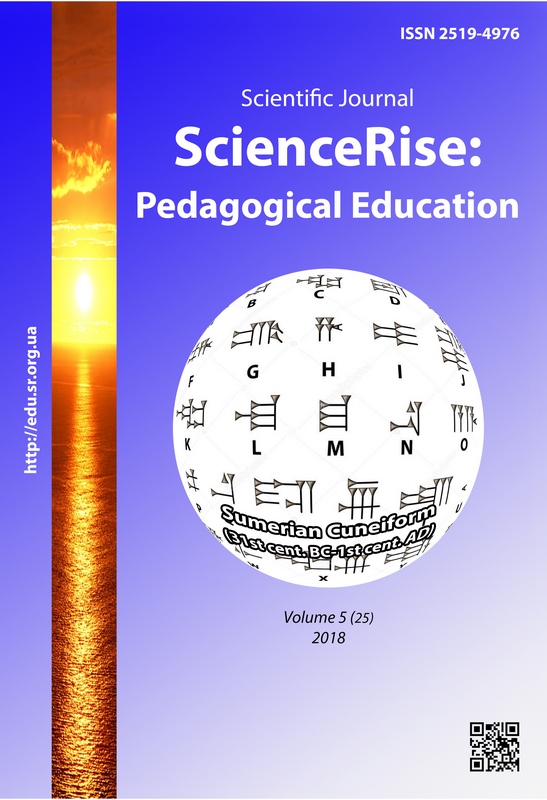Structured system analysis of determination of modern key competences in the world
DOI:
https://doi.org/10.15587/2519-4984.2018.139110Keywords:
competence, key competencies, interstate structures, non-profit organizations, efficiency of education systemsAbstract
There were analyzed Normative documents of the interstate structures (UNESCO, UNICEF, UNDP, the International Department of Standards) and non-profit international organizations and foundations (the Roman Club, the 21st Century Partnership, the Center for the Redesign of Educational Programs, the Institute for Business Ethics, the World Education Forum, the Students' Training School Oxford University and the British Nesta Foundation for the Development of Innovations), developed over the last decades, the world experience in identifying competencies was outlined. The content of the terms "competence", "key competencies" in order to determine the categorical apparatus and the terminology of the research was specified. The results of long-term research of competencies in 100 countries of the world were presented in order to identify and select the key ones, and their comparative analysis of 2015 and 2020 was presented by analysts and experts of Worldwide Economic Forum. The data of the conducted research testify that the competence in the complex solution of problems remains as a priority in the modern world space. Critical thinking and creativity should ensure the selection of information, its correct rethinking; contribute to the fullest disclosure of talents and capacity building. The system-structural scheme of analysis of the definition of key competencies in the world by interstate structures and non-profit international organizations and foundations was created. Global problems of the educational crisis rise were characterized and requirements of society for specialists were defined. Foreign practice of solving modern problems and formulating the requirements for the 21st century education was characterized, essential characteristics of updated key competencies for further implementation of international norms into the educational process of domestic educational institutions were revealed. It was proved that for successful implementation of competences in educational programs and plans it is necessary to determine their general set within educational institutions depending on the branches of knowledge and specialization and provide educators and academic staff with necessary scientific, methodological and methodical tools, develop their ability to self-education and making a career and a new way of teaching others
References
- Dryden, G., Vos, G. (2011). Revolution in teaching. Lviv: Chronicle, 544.
- Delour, G. Education: A Hidden Treasure: Thesis of the Report of the International Commission on the 21st Century Education. UNESCO, 1996. Available at: https://www.ifap.ru/library/book201.pdf
- Definition and selection of competences (DeSeCo): theoretical and conceptual foundations: strategy paper. Available at: http://www.voced.edu.au/content/ngv%3A9408
- Partnership for 21st Century Skills (2016). Available at: http://www.p21.org/storage/documents/21st_Century_Skills_Assessment_e-paper.pdf
- Fadel, C., Bialik, M. (2017). Assessments for the 21st Century. Available at: https://www.nais.org/magazine/independent-school/winter-2017/assessments-for-the-21st-century/
- Trilling, B., Fadel, C. (2009). 21st Century Skills: Learning for Life in Our Times. Jossey-Bass. Available at: https://yasamboyuogrenme.wikispaces.com/file/view/21st+CENTURY+SKILLS.pdf
- Promoting Cultures of Integrity: Six Ethical Issues for Business Education. Available at: https://www.ibe.org.uk/business-ethics/53/53
- Von Weizsaecker, E., Wijkman, A. (2018). Come On! Capitalism, Short-termism, Population and the Destruction of the Planet. Springer, 220.
- New vision for education: unlocking the potential of technology. Available at: http://www3.weforum.org/docs/WEFUSA_NewVisionforEducation_Report2015.pdf
- The Future of Jobs. Employment, Skills and Workforce Strategy for the Fourth Industrial Revolution. Available at: http://www3.weforum.org/docs/WEF_Future_of_Jobs.pdf
- Gray, A. (2016). The 10 skills you need to thrive in the Fourth Industrial Revolution. Available at: https://www.weforum.org/agenda/2016/01/the-10-skills-you-need-to-thrive-in-the-fourth-industrial-revolution/
- The United Kingdom (UK) plays host to the world’s largest gathering of education and skills ministers from 21–24 January 2018. Available at: https://thepienews.com/event/education-world-forum-2018/
- Effective Teacher Policies Insights from PISA. Available at: http://www.oecd.org/education/effective-teacher-policies-9789264301603-en.htm
Downloads
Published
How to Cite
Issue
Section
License
Copyright (c) 2018 Svitlana Tolochko

This work is licensed under a Creative Commons Attribution 4.0 International License.
Our journal abides by the Creative Commons CC BY copyright rights and permissions for open access journals.
Authors, who are published in this journal, agree to the following conditions:
1. The authors reserve the right to authorship of the work and pass the first publication right of this work to the journal under the terms of a Creative Commons CC BY, which allows others to freely distribute the published research with the obligatory reference to the authors of the original work and the first publication of the work in this journal.
2. The authors have the right to conclude separate supplement agreements that relate to non-exclusive work distribution in the form in which it has been published by the journal (for example, to upload the work to the online storage of the journal or publish it as part of a monograph), provided that the reference to the first publication of the work in this journal is included.








